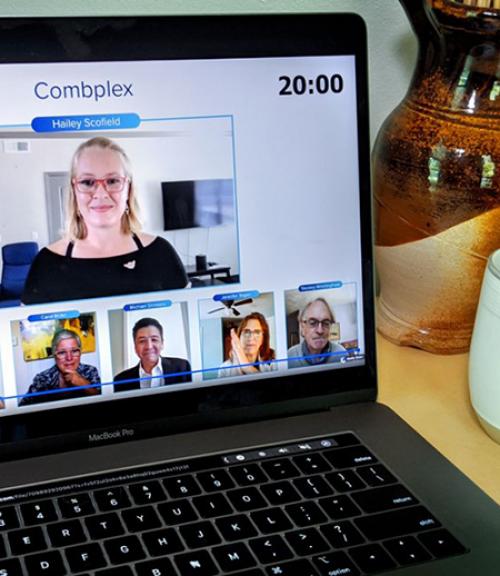New York’s Southern Tier is getting a jolt of clean-energy innovation, fueled by Cornell alumni.
The fifth annual 76West Clean Energy Competition, held virtually Aug. 18-19, featured three Cornellian-led teams. The pitch competition, supported by Empire State Development and the New York State Energy Research and Development Authority (NYSERDA), aims to generate economic development in the Southern Tier by attracting cutting-edge startup companies from around the globe that specialize in clean-energy technology.
This year’s 19 semifinalists, selected from 183 applicants, made their pitches to a panel of judges at a virtual session hosted by the Southern Tier Startup Alliance.
The teams were paired with a mentor who helped them prepare for the competition and connect with potential partners in the region. Their pitches addressed an array of clean-energy innovations, including renewable energy, energy storage and efficiency, and transportation.
The judges for 76West – the name refers to the Southern Tier’s location at 76 degrees west longitude – will select four finalists to split $2.5 million in prizes, with a $1 million grand prize and three $500,000 awards. The winning companies will be announced in the fall.
Doctoral students Hailey Scofield and Nathan Oakes, both former research fellows with the Cornell Atkinson Center for Sustainability, pitched their startup, Combplex.
Scofield and Oakes, the company’s CEO and CTO, respectively, formed Combplex as a way to eliminate pests that threaten the health of honeybee hives – specifically Varroa mites, which have been devastating American honeybee populations since the mid-1980s.
Combplex’s smart frame technology uses sensors to automatically identify mites that enter the colony, and a low-power laser pulse zaps them, causing the mites’ exoskeletons to erupt. The sensors also collect valuable data about the colony that enables beekeepers to make more informed decisions about hive care and recognize intensive pesticide use.
“Being able to present our story in a clean-energy competition such as 76West is meaningful for us,” Oakes said, “not just because the potential to win could help us revolutionize beekeeping, but also because it demonstrates that clean-energy experts are taking seriously innovative natural solutions to climate change. … Ultimately, more healthy and more plentiful pollinators reduce fertilizer costs, reduce greenhouse gas emissions and increase yields year after year.”
This year was the third time Gabriel G. Rodríguez-Calero, Ph.D. ’14, competed with Ecolectro, the company he co-founded with Kristina Hugar, Ph.D. ’15.
Ecolectro grew out of Hugar’s graduate work in the research lab of Geoffrey W. Coates, the Tisch University Professor of Chemistry.
The technology replaces expensive metals, such as platinum and iridium, with cheap base metals, such as nickel and steel, in commercial electrochemical devices that make hydrogen, therefore reducing the cost of renewable hydrogen technologies.
The competition’s winning companies must either move to the Southern Tier or establish a direct connection with the region’s economy through job creation or supply-chain partnerships. If companies are already local, they must commit to substantially growing their business and adding jobs in the region.
“An investment from 76West will create high paying jobs in Tompkins County and establish a key climate tech company at the center of the clean energy transition in New York state,” Rodríguez-Calero said. “We have the opportunity to solve one of the world’s toughest problems – i.e. greenhouse gas emissions – while building a great team here in the Southern Tier.”
Also competing this year was Heat Inverse, founded by Romy Fain, Ph.D. ‘17. The company, which also competed last year, makes thin-film materials that cool passively without generating waste heat, thereby increasing the efficiency of cooling systems while reducing greenhouse gas emissions. The company was paired with mentor Drury MacKenzie, visiting professor of entrepreneurial studies at Hobart and William Smith Colleges.
“Despite COVID making the networking part of this competition more difficult this year, we still got a lot of benefit, mostly due to our mentor for the program,” Fain said. “Drury helped us make connections both in the region and nationally, and both in refrigerated trucking and in the energy industry where she has deep expertise.”
While the official program has ended, Fain said Heat Inverse is continuing to see the benefits of these connections, as the company moves forward on multiple pilots with potential customers, directly resulting from this support.
“New York state is truly a national leader in pushing and investing in a clean-energy future,” said Brian Bauer, director of competitions at the Cornell Center for Regional Economic Advancement, the organization administering the competition. “In searching the globe for the best clean energy startups over the past five years, this unrivaled competition has built a hub of clean energy innovation in the Southern Tier that has built tremendous momentum.”




